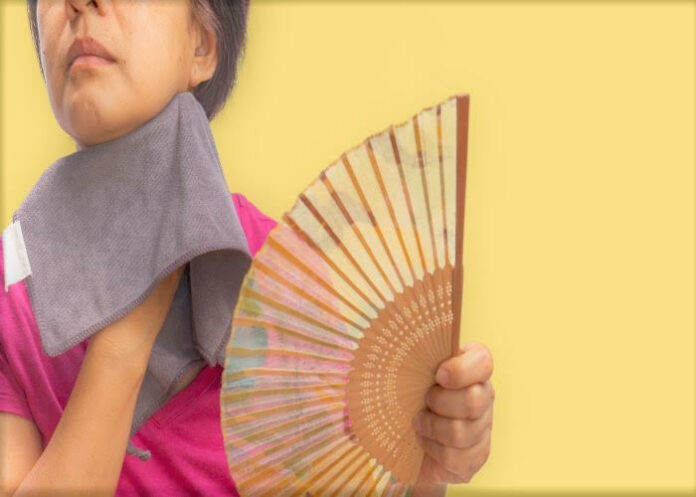Women who experience more hot flashes and night sweats during menopause may have more of a brain biomarker called white matter hyperintensities, which has been linked, in some research, to an increased risk of stroke, Alzheimer’s disease and cognitive decline, reports a recent study.
The authors said their findings question the common perception that hot flashes and night sweats are benign symptoms that don’t have much importance in women’s medical care, and underscore the potential links of these symptoms to brain health.
In the study, published in the online issue of Neurology®, the medical journal of the American Academy of Neurology, the authors described white matter hyperintensities as tiny lesions visible on brain scans that become more common with age or with uncontrolled high blood pressure.
“Previous research has shown that the menopause transition is associated with a worsening of women’s cardiovascular health,” said study author Rebecca Thurston, PhD, of the University of Pittsburgh in Pennsylvania. “Menopause is also increasingly recognised as an important transition for women’s brain health. Our study specifically looked at the common symptoms of menopause, hot flashes and night sweats, and how they are related to white matter hyperintensities in the brain.”
The study involved 226 women with an average age of 59 who did not use hormone therapy. They had an average of five hot flashes or night sweats over a 24-hour period, approximately three hot flashes when they were awake and two night sweats during sleep.
Researchers monitored participants for three days. For the first 24 hours, participants wore a device that monitors hot flashes and night sweats through the temperature of the skin. For three days, they self-reported their hot flashes and night sweats in an electronic diary. They also wore a device on their wrist that monitored sleep and completed a sleep diary. After the three-day period, they completed blood tests as well as brain scans to measure white matter hyperintensities in six regions of the brain.
After adjusting for age and vascular risk factors such as high blood pressure and diabetes, researchers found that associations between hot flashes or night sweats and white matter hyperintensities persisted and that with every additional night sweat there was approximately a 6% increase in the amount of white matter hyperintensities in the brain.
Hot flashes and night sweats were most linked to white matter hyperintensities in the frontal lobe of the brain, the area responsible for voluntary movement, expressive language, and the ability to plan and organise.
“Hot flashes have the potential to serve as a midlife marker of brain health in women that may ultimately help identify women who are more likely to have poor brain health as they age,” said Thurston.
Newswise reports that a limitation of the study was that most participants were white. Thurston says future research should include more women from other racial and ethnic groups.
Study details
Menopausal Vasomotor Symptoms and White Matter Hyperintensities in Midlife Women
Rebecca Thurston, Minjie Wu, Yue-Fang Chang, Howard J. Aizenstein, Carol Derby, Emma Barinas-Mitchell, Pauline Maki.
Published in Neurology on 12 October 2022
Abstract
Background and objectives
The menopause transition is increasingly recognised as a time of importance for women’s brain health. A growing body of work indicates that the classic menopausal symptom, vasomotor symptoms (VMS), may be associated with poorer cardiovascular health. Other work links VMS to poorer cognition. We investigate whether VMS, when rigorously assessed using physiologic measures, are associated with greater white matter hyperintensity volume (WMHV) among midlife women. We consider a range of potential explanatory factors in these associations and explore whether VMS are associated with the spatial distribution of WMHV.
Methods
Women aged 45-67 and free of hormone therapy underwent 24 hours of physiologic VMS monitoring (sternal skin conductance), actigraphy assessment of sleep, physical measures, phlebotomy, and 3 Tesla neuroimaging. Associations between VMS (24-hour, wake, and sleep VMS, with wake and sleep intervals defined by actigraphy) and whole brain WMHV were considered in linear regression models adjusted for age, race, education, smoking, body mass index, blood pressure, insulin resistance, and lipids. Secondary models considered WMHV in specific brain regions (deep, periventricular, frontal, temporal, parietal, occipital) and additional covariates including sleep.
Results
The study sample included 226 women. Physiologically-assessed VMS were associated with greater whole brain WMHV in multivariable models, with the strongest associations observed for sleep VMS [24-hour VMS, B(SE)=.095 (.045), p=.032; Wake VMS, B(SE)=.078 (.046), p=.089, Sleep VMS, B(SE)= .173 (.060), p=.004]. Associations were not accounted for by additional covariates including actigraphy-assessed sleep (wake after sleep onset). When considering the spatial distribution of WMHV, sleep VMS were associated with both deep WMHV, periventricular WMHV, and frontal lobe WMHV.
Discussion
VMS, particularly VMS occurring during sleep, were associated with greater WMHV. Identification of female-specific midlife markers of poor brain health later in life is critical to identify women who warrant early intervention and prevention. VMS have the potential to serve as female-specific midlife markers of brain health in women.
See more from MedicalBrief archives:
HRT should be given earlier as menopause ‘reshapes the brainʼ – Nature Scientific Reports
Early menopause may raise dementia risk later – UK study of 150,000 women
Hormone therapy associated with improved cognition

